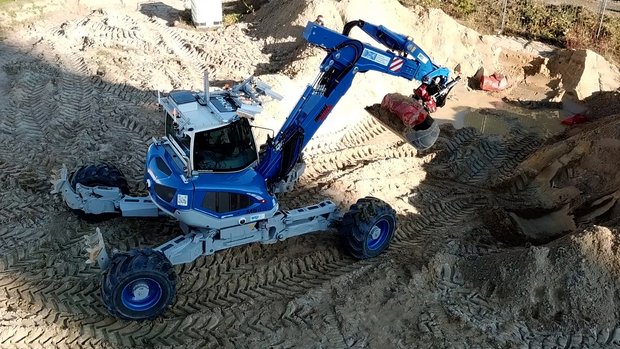


Applied AI - Terrestrial
Intelligent robots will play a key role in future industrial manufacturing and agricultural production. Relevant robotic capabilities are mobility in production facilities (indoor) and difficult terrain (outdoor), as well as manipulation capabilities to grasp, manipulate and transport materials, tools and crops. The cross-sectional topic of the "Terrestrial Robotics" team is thus "Mobile Manipulation". This includes hardware and software solutions for a wide range of robotics topics, focusing on the following application areas:
• Production & Retail
• Agricultural and forestry robotics
• Search & rescue applications
• Electromobility and automated driving
In the area of "Production", the team is dedicated to the development of robotic systems that can act autonomously and support humans in industrial production environments. Focus is set on research of intelligent human-robot collaboration for production scenarios in which humans and robots work together in hybrid teams without separating protective fences. On the one hand, this requires modular, novel and inherently safe robots that enable reliable interaction with humans. On the other hand, systems are needed that can be programmed intuitively and used sensibly in flexible low-volume manufacturing.
In the field of agricultural and forestry robotics, the mobility component is taking a greater importance. Here, mobile systems are developed that have to prove themselves in natural environments and difficult weather conditions. Furthermore, especially in the field of robotic harvesting support, precise manipulation and gentle handling of sensitive fruit is a major focus of development. Robotic systems can also be used to automate the mapping of nutrients, plant health or pest infestation, or to enable this at the necessary granularity in the first place.
Robotic systems for search & rescue applications are being developed in close collaboration with end users. The aim here is to support and relieve the rescue forces in order to be able to carry out the demanding work of rescuing people in disaster situations as efficiently as possible. Natural disasters or building collapses place the highest demands on the locomotion apparatus of the mobile systems. In addition, close collaboration between humans and robots is also necessary here, so that comparable safety precautions to those in the "Production" area apply. The automation of construction machinery is another research area that makes it possible to keep humans out of dangerous situations, such as those that occur during the decontamination of landfills (explosions, escape of gases hazardous to health, etc). Work is carried out from a safe distance or, depending on the degree of automation, only monitored by human operators.
In the context of electromobility, new mobility concepts are being designed to help shape the mobility of tomorrow. This includes series-production vehicles converted into experimental platforms for automated driving, as well as the complete design and construction of a demonstrator for flexible urban mobility (EO Smart Connecting Car). In addition, research projects are investigating micromobility approaches to relieve the burden on parcel delivery drivers and to advance local electrified logistics in cities.
Application areas in the Terrestrial team:
Production and retail
• Human-robot collaboration
• Flexible Manufacturing
• (Intra-)Logistics
Agricultural robotics
• Harvesting of fruits and vegetables
• Mobility in agricultural areas
• Mobility in forest areas
Search & rescue robotics
• Automated transport in disaster scenarios
• Robotic decontamination of landfills
Electromobility and automated driving
• Design of electromobility solutions
• Automated driving
• Automated delivery systems
Team lead: Ajish Babu, M.Sc.
Deputy: Dipl.-Inf. Malte Wirkus
